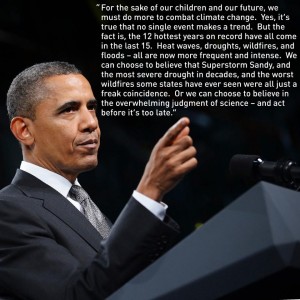Nubifragio a Catania: esempio di vulnerabilità
Gli effetti del nubifragio di Catania sono freschi e sotto gli occhi di tutti: era difficilmente prevedibile la quantità di pioggia caduta, ma il collasso dell’unico collettore che “protegge” la città ha fatto in modo che si verificasse quanto è poi accaduto. Una zona troppo urbanizzata senza gli adeguati strumenti tecnici per far fronte agli imprevisti. E il nubifragio di Catania, per quanto intenso e “rapido”, non era certo un Sandy.
Il “Sistema Paese” Italia ha una vulnerabilità altissima nei confronti del rischio idrogeologico. In alcune zone anche di fronte ad eventi meno estremi di altri.Politiche climatiche di adattamento, declinate come supporto agli Enti Locali, sono la base per svolgere la tutela e la manutenzione del territorio. Un tema centrale. Un tema assente dalla oramai conclusa campagna elettorale.
Una decina di giorni fa si è tenuto il discorso del Presidente degli Stati Uniti sullo stato dell’Unione. Obama ha parlato anche di cambiamenti climatici e di azioni da pianificare e da inserire nella strategia di uscita dalla crisi globale. Riportiamo di seguito il cuore del discorso sulla tematica climatica.
But for the sake of our children and our future, we must do more to combat climate change. Now, it’s true that no single event makes a trend. But the fact is the 12 hottest years on record have all come in the last 15. Heat waves, droughts, wildfires, floods — all are now more frequent and more intense.
We can choose to believe that Superstorm Sandy, and the most severe drought in decades, and the worst wildfires some states have ever seen were all just a freak coincidence.
Or we can choose to believe in the overwhelming judgment of science — and act before it’s too late. Now, the good news is we can make meaningful progress on this issue while driving strong economic growth.
I urge this Congress to get together, pursue a bipartisan, market-based solution to climate change, like the one John McCain and Joe Lieberman worked on together a few years ago.
But if Congress won’t act soon to protect future generations, I will. I will direct my Cabinet to come up with executive actions we can take, now and in the future, to reduce pollution, prepare our communities for the consequences of climate change, and speed the transition to more sustainable sources of energy.
Four years ago, other countries dominated the clean energy market and the jobs that came with it. And we’ve begun to change that. Last year, wind energy added nearly half of all new power capacity in America. So let’s generate even more. Solar energy gets cheaper by the year — let’s drive down costs even further. As long as countries like China keep going all in on clean energy, so must we.
Sul sito della Casa Bianca è possibile trovare sia il testo integrale che il video.
Gli osservatori potranno criticare i contenuti, ma le tesi di Obama sono supportate dalla consapevolezza dell’esistenza di problemi complessi che richiedono una visione strategica e l’adozione di una cultura scientifica all’interno del percorso decisionale.
In Italia, invece, i processi decisionali sembrano guidati dalle urla, dai sondaggi, dalle battute di dubbio gusto o dalla facile ironia. I casi sono due: o siamo veramente un Paese allo sbando, o ci piace ammorbare i cittadini con il circo (d’altronde è un marchio di fabbrica italiano che risale all’Antica Roma) e lo teniamo all’oscuro dei programmi e delle idee perché un popolo colto è più difficile da governare.
Questo blog è stato pubblicato sul Fatto Quotidiano il 22 febbraio 2013.

